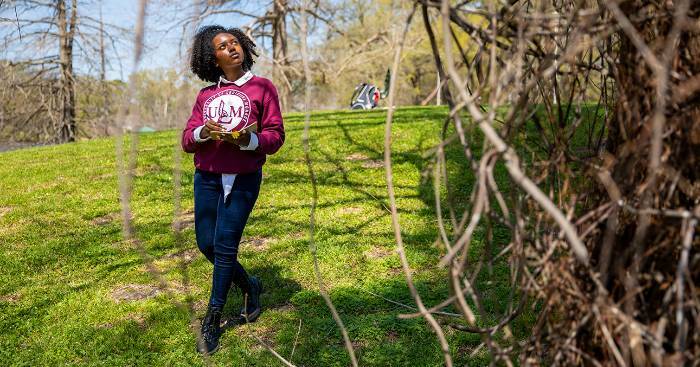
 Nautica Jones is a ULM undergraduate majoring in biology. Thanks to a $3,000 grant
from the Garden Club of America, she is studying Louisiana’s diminishing chenier forests.
Siddharth Gaulee/ULM Photo Services
Nautica Jones is a ULM undergraduate majoring in biology. Thanks to a $3,000 grant
from the Garden Club of America, she is studying Louisiana’s diminishing chenier forests.
Siddharth Gaulee/ULM Photo Services
University of Louisiana Monroe biology major Nautica Jones loves Louisiana’s semi-tropical climate and its variety of ecosystems, from the marshes at the Gulf of Mexico to the pine-covered hills in the northern region of the state.
Jones’ interrelated interests in climate change and nature led her to write a research grant proposal to study one of Louisiana’s threatened terrains, the chenier forests.
Cheniers (French, chene meaning oak, [shin’-yay]) are coastal live-oak forest communities that were historically expansive. These unique forested ecosystems are now reduced to remnant patches.
Jones’ “Reassessment of vegetation diversity in a relic Louisiana Chenier” was accepted by the Garden Club of America and funded with a $3,000 grant.
Working with her research mentor, ULM Professor of Biology Joydeep Bhattacharjee, Ph.D., Jones is investigating the effects of climate change and invasive species on the remaining chenier forests of southern Louisiana.
Jones’ interest in the impact of climate change on plant communities came after witnessing the disproportionate effects of hurricanes Katrina and Rita in minority areas – before and after the devastating storms.

“Plant communities are our greatest allies in the climate crisis,” said Jones, “however, access to green spaces and the resources necessary for their management are not equitably distributed, forming a barrier to the equitable adaptation of all humans to climate change.”
The cheniers are also heritage sites for the Atakapa Native American people of Louisiana.
Archaeological finds from the cheniers have been important in documenting the tribe’s
history, according to Jones.
Ecologically, these forests play a key role in preventing coastal erosion and act as barriers to hurricanes. Jones hopes that her research findings can help develop effective management plans to conserve the cheniers and contribute to the solution set for human climate change adaptation.
“Nautica has been working in my lab for about a year now, and this project has been in development since then. We plan on using a combination of multispectral imagery obtained by UAVs, drones, and vegetation data collected on-ground for this project,” Bhattacharjee said.
“Above all, the Garden Club of America grant awards are extremely competitive and are only awarded nationally to only four to seven students a year. It is a testament to the type of research and competitiveness that ULM undergraduates are capable of,” he said.
Jones accepted an internship at the Harvard Forest Summer Research Program in Ecology. She is working on forest carbon sequestration. Jones will use time-lapse digital photography to study how forests in the northeastern United States combat climate change.
Jones’ internship opportunity is in line with the research Bhattacharjee’s lab is undertaking at ULM.
“I would like to compare data collected at the Harvard experimental forest with the data collected at the ULM carbon tower in Russell Sage Wildlife Management Area, as a part of a separate project. I hope that my work and presence in the scientific community will inspire children, especially girls, of color to pursue careers in avenues where they may not have been able to see themselves before,” said Jones.